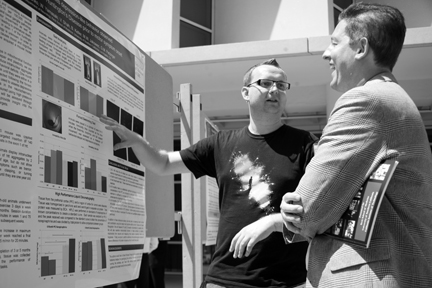As Tom Buchanan, vice dean for research of the Keck School of Medicine of USC, welcomed the room full of MD/PhD candidates to the annual USC-Caltech MD/PhD symposium, he had a very simple message — doing good science will make you happy.
“To me, at its core, science is fun,” he stated. “There are incredibly complicated structures in the world out there, and as a scientist, you get to figure out how the world works. … And medicine at its core is a real opportunity to do good for society. With an MD/PhD, you can make a difference in the way medicine is practiced. You can have an impact on a very large number of people while doing science, and I can’t think of a better thing than that.”

MD/PhD candidate Daniel Stefanko (left) discusses his research poster, “Exercise Ameliorates Depression-like behavior observed in a mouse model of Huntington’s Disease Prior to Motor Symptom Onset” at the annual MD/PhD symposium held on June 13.
Photo/Ryan Ball
In his opening remarks at the symposium, held on June 13 at the Eli and Edythe Broad CIRM Center for Regenerative Medicine and Stem Cell Research at USC, Robert Chow, associate professor of physiology and biophysics at the Keck School and co-director of the USC-Caltech MD/PhD program, emphasized the long road that basic research may take before it can translate into clinical innovation. He noted that the important groundwork of today’s “human genome revolution” was laid more than 100 years ago.
“At the time, people were just looking at viruses, bacteria, slime molds — there was no idea of what was in store for biomedical research,” said Chow. “The long-term health of the overall research enterprise entirely depends on the very strong continuation of basic science research.”
The annual symposium gives students in the MD/PhD program an opportunity to present their research to their peers. Candidates Jordan Pomeroy, Arya Khosravi, Devin Wiley, Daniel Naftalovich and Melanie Lee gave oral presentations, and 25 additional students had poster presentations describing their areas of research.
For first-year student Ahuva Weltman, the symposium is a chance for her to learn from and interact with those peers. “It makes great connections,” she said. “I can see the research that other people are working on, see if we have common interests, and see if it’s for me.”
Capping off the student presentations, Berislav Zlokovic, director of the Zilkha Neurogenetic Institute and a professor and chairman of the Department of Physiology and Biophysics, gave the keynote address, “Blood-Brain Barrier and Neurodegeneration.” Throughout his talk, Zlokovic was keen to note the contributions of individual student researchers working in his labs, as well as the success for former students who moved on from his lab to leadership positions in academia and the corporate world.

